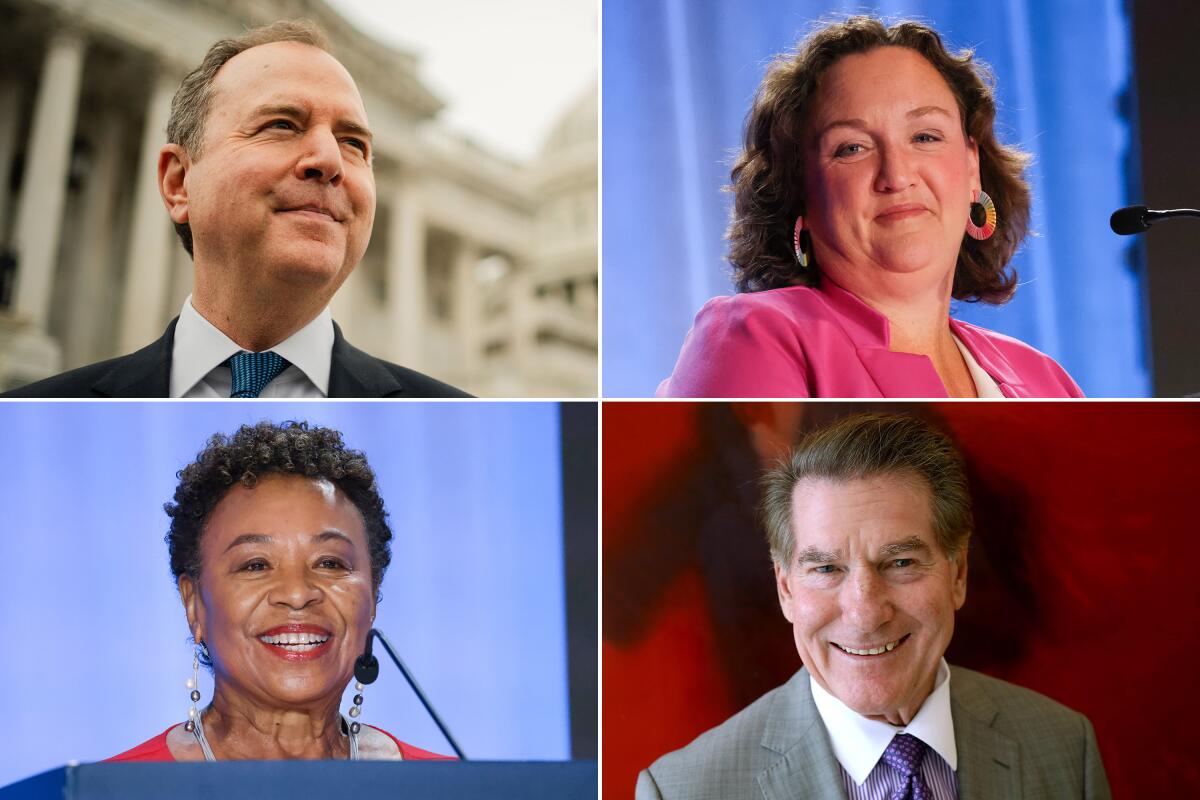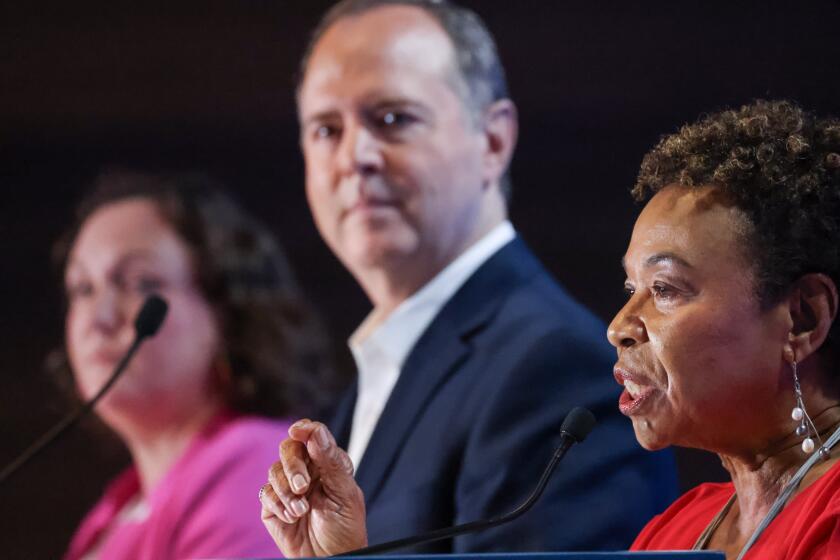Schiff takes narrow lead in Senate race; tight contest for second, new poll shows

The fight for second place in California’s U.S. Senate race between Rep. Katie Porter and former Dodgers star Steve Garvey appears volatile as the March 5 primary approaches, according to the latest UC Berkeley Institute of Governmental Studies poll co-sponsored by The Times.
Democratic Rep. Adam B. Schiff of Burbank leads the field by 4 percentage points in a race that thus far has lacked much sizzle, though that could change now that the candidates have launched political ad campaigns and are set to clash in a trio of televised debates over the next two months.
According to the survey, Porter (D-Irvine) trails slightly behind Schiff and holds a narrow lead for second place over Garvey, the top Republican in the race.
Schiff is backed by 21% of likely voters, compared with 17% supporting Porter and 13% for Garvey. Schiff and Porter were essentially tied in Berkeley’s poll in October.
The other top Democrat in the race, Rep. Barbara Lee of Oakland, was supported by 9% of likely voters, the poll found. About a fifth of the voters surveyed picked one of the 23 other candidates on the crowded ballot, and the remainder said they were undecided
The top two vote-getters, regardless of party and share of the vote, will compete against each other in November. Given the Democrats’ huge registration advantage in the state, if Garvey advanced to the general election he’d be at a sizable disadvantage.
The poll also showed how divisions among voters over the war between Israel and Hamas in Gaza are having an effect on the contest.
War in the Mideast has sharply divided California voters along lines of age and ideology. President Biden is caught in the middle, opposed by both left and right for his response to the fighting.
Voters will be asked to vote on two separate Senate elections on the March ballot — one for the full six-year Senate term starting in January and the other for the remaining months of the term of the late Sen. Dianne Feinstein.
In that second race, only seven candidates are listed, and the poll found tighter margins. Schiff still leads among likely voters with 21% support. Porter has 18%, Garvey has 17%, Lee has 12% and Republican Eric Early has 11%.
The contrast between the two races shows that when the number of candidates — particularly Republicans — consolidates, Garvey’s support grows, said Mark DiCamillo, director of the Institute of Governmental Studies poll and a longtime California pollster.
That offers evidence that Garvey has the opportunity to finish in the top two in the March primary and qualify for the November general election, rather than having two Democrats meeting in the fall, DiCamillo said.
“The open question really is who’s going to be second, and our poll is showing Katie Porter still ahead of Garvey, although there has been movement toward Garvey in each of our polls,” he said.
“There’s an opportunity for him to coalesce the Republican votes to come his way, certainly. I think the debate will help in that regard.”
Garvey’s support has nearly doubled since Berkeley’s poll in August, while Porter’s numbers have remained about the same.
The poll found that of the four top candidates, Schiff and Porter were the only candidates whom a majority of likely voters knew enough about to have an impression. Schiff, a ubiquitous guest on cable news shows, captured the national spotlight when he led the first impeachment trial of then-President Trump.
About 43% of likely voters had a favorable view and 31% an unfavorable view of Schiff. He’s popular among Democrats (67% have a favorable view) and unpopular among Republicans (68% have an unfavorable view).
Porter is less well known but still popular, with 39% of likely voters saying they had a favorable impression of her. Just 16% said they had an unfavorable impression of her. The rest (45%) had no opinion.
Garvey, who officially entered the race in October, wants to leverage his fame among older sports fans. The 75-year-old played for the Dodgers and the San Diego Padres, but he hasn’t taken the field since the 1980s. He’s viewed favorably among 24% of likely voters and unfavorably by 21%.The rest had no opinion of him.
Schiff’s small lead is fueled in part by his ability over the last few months to increase his backing in voter-rich Los Angeles County. In the October poll, Porter led by 4 percentage points on Schiff’s turf (22%-18%); now he is up by the same margin in the county (23%-19%). Schiff also leads by large margins in the Bay Area, Central Valley and Sacramento regions.
Hamas’ attack on Israel has highlighted the differences among the foreign policy instincts — and experience — of the leading Democratic candidates for U.S. Senate in California.
Porter is up by 12 percentage points (24%-12%) at home in Orange County, while the two are essentially tied in the Inland Empire and the San Diego region.
The most potent political issue of the moment — the Israel-Hamas war— shows the very different coalitions backing each of the major candidates. Schiff has been a vocal backer of Israel and President Biden’s strategy in the region. Both Schiff and Garvey say that the United States should continue military aid to Israel.
Both Lee and Porter back a cease-fire. Lee opposes providing further military aid to Israel, and Porter has called for a “robust discussion” about military assistance.
Schiff supporters were far more likely to approve of Biden’s response to the war than Garvey or Lee supporters. Porter backers were split down the middle about how they felt about Biden’s diplomatic response in the aftermath of Hamas’ Oct. 7 massacre in Israel.
About 8 in 10 supporters of Garvey were more sympathetic to Israel than the Palestinians, while Lee backers are sympathetic to the Palestinians by more than 2 to 1.
About half of Schiff supporters and 40% of Porter backers said they were equally sympathetic to both sides of the conflict.
The coalitions supporting each candidate have shifted slightly in recent months.
Porter still garners the most support from voters under 50 and those who identify as strongly liberal. Schiff is ahead with voters 65 and older and those who identify as somewhat liberal. Schiff and Porter had been essentially tied in October among voters who identify as Democrats. Now Schiff leads by 10 percentage points among that very large voting bloc.
Lee, who is one of three Black members of Congress from California, had been leading among Black voters statewide but now is essentially tied with Schiff — who leads with Asian American/Pacific Islander voters and white voters. Schiff and Porter are essentially tied among Latino voters.
One remaining big unknown is how voters respond to the barrage of television advertising that is about to start in the state.
It’s hard to assess the true political strength of any candidate in California until they start running TV ads, said Republican strategist Mike Murphy, who worked on Gov. Arnold Schwarzenegger’s campaign team.
Porter is “starting her TV imminently. Schiff will be right behind her by a few days. He’ll probably have more, but she’s got more charisma. So there’s a little more rocket fuel there if she catches on,” Murphy said.
“The Democratic campaigns are obsessed with Garvey. That’s not because they care about [Garvey winning in] November. If he comes in second, Schiff just won the lottery.”
Both Porter and Schiff have begun or will begin airing ads on cable and broadcast television in Bay Area-San Jose and Oakland markets this week.
Schiff’s ad focuses on some of his accomplishments in Congress. Porter’s ad is focused on how she plans “to shake up the Senate” by banning earmarks, abolishing the filibuster and prohibiting senators from trading individual stocks, among other proposals.
A Schiff spokeswoman said the campaign put “over $700,000” into its ad, while the Porter campaign told the San Francisco Chronicle it made a “seven-figure ad buy.”
Schiff has a significant financial advantage over his competitors. Last week his campaign revealed that it had $35 million on hand after the last fundraising quarter, as of the end of the year.
Porter had about about $12 million on hand through the end of September, according to campaign disclosures. Lee was further behind with $1.3 million through September, filings show.
The Berkeley IGS poll surveyed 4,470 registered California voters considered likely to participate in the March primary. The poll was conducted online in English and Spanish on Jan. 4-8.
The results were weighted to match census and voter registration benchmarks, so estimates of the margin of error may be imprecise; however, the results for the likely voter sample have an estimated margin of error of 2 percentage points in either direction.
More to Read
Get the L.A. Times Politics newsletter
Deeply reported insights into legislation, politics and policy from Sacramento, Washington and beyond. In your inbox three times per week.
You may occasionally receive promotional content from the Los Angeles Times.













